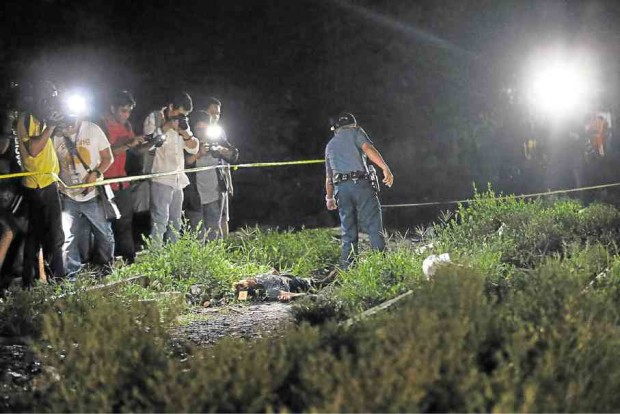
FOLLOW THE BLOOD. Media crews take photos of a suspected drug pusher killed by the police in a Sept. 30 operation that ended along the railroad tracks in Maypajo, Caloocan City. RAFFY LERMA
As the death toll rises, the graveyard shift comes to life.
The first three months that saw President Duterte unleashing government forces for his war on drugs—while also encouraging the general public to kill drug dealers—have kept journalists up late at night and into the wee hours.
A nightlong coverage can sometimes send them in quick succession from a blood-splattered alley to a bullet-riddled home or a sidewalk where killers have dumped a corpse.
“Before, it’s a rarity: Just one homicide or murder can get us agitated as we rush to the crime scene,” said radio reporter Olan Bola. “Now it has become routine. You know someone will die every night.”
The deaths are generally being listed according to two categories: Those counted as the result of police operations and those attributed to “vigilante-style” attacks.
If there is a single mind or machinery behind all these, then it apparently keeps a schedule, between 10 p.m. and 5 a.m., for that’s when most drug-related killings are reported.
‘What can we do?’
For the local and foreign news teams that keep track, the assignment often leads them to shantytowns, where residents roused from sleep by gunshots would find a neighbor slumped on the floor or a stranger hogtied on the curb.
“What can we do? We are poor and powerless,” goes the usual chorus coming from the onlookers, as police investigators cordon off the scene and funeral home workers arrive. (Lately, the latter’s services have also been in high demand at night.)
Indeed, what can they do if the police tag the slain person as a drug suspect, often with nothing more than a “watch list” put together by barangay officials as basis?
What can they do if the victim, whom they know to be jobless, deep in debt or in penury, is suddenly described in police reports as someone who kept a few packets of “shabu” in store and could still afford to buy a gun—often a .38-caliber revolver?
Even for veteran foreign journalists, the growing scale and seeming regularity of the killings can still give them pause. But the shock doesn’t end there.
“It surprises me that these deaths are acceptable here,” said “Chan,” a Chinese correspondent who requested that his real name not be used in this report so as not to jeopardize his coverage.
Incomprehensible
In the early morning of Oct. 14, four men were killed by the police in what they said was an antidrug operation that had the targets cornered in a vacant lot in Malate, Manila. “It was the first time (I saw) four dead bodies all in one place,” Chan recalled.
“It’s incomprehensible,” he added. “I guess I wanted to find out what people think about it. From where I come from, a warning shot by a policeman would grab the headlines for weeks.”
Like Chan, Le Monde’s Harold Thibault flew into the country to “understand why the citizens of the Philippines voted for a person who did not hide his plan to use violence.”
“Many French people would be shocked to hear a politician say ‘go ahead and kill.’ We think strict criminal procedures are the only way to get fair justice,” Thibault said.
Another foreign correspondent said he wanted to plumb the Filipino psyche and see what the 6th Commandment—Thou shalt not kill—now means to a society that is 80-percent Catholic.
Local journalists observed that the number of foreign media personnel documenting the Duterte administration’s war on drugs has equaled, if not surpassed, the total of those who came to cover the November 2013 Typhoon “Yolanda” disaster and the January 2015 visit of Pope Francis.
Blood-thirsty policy
They include Pulitzer prize winners, heads of wire news agencies and filmmakers.
Chan, who said he first learned about the Philippine situation through the eyes of the Western press, noted that “when I came here, I found out that (President Duterte) is really popular. Some Filipinos love and support him because crime, corruption, and (government) inefficiency have made them desperate for real change.”
But he found the level of violence unfolding before him to be “alarming” and fueled by “a blood-thirsty policy.”
“Yes, I believe drugs are bad, sure. But what I want to know is: do they deserve to die?” Chan said. “It is basically dangerous for the country to see powers that are not restricted. If you keep letting those things happen, today drug pushers will be killed. But who’ll be next?”